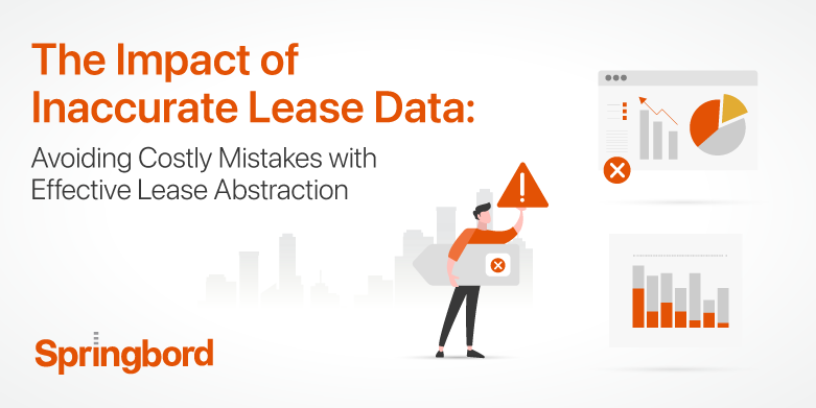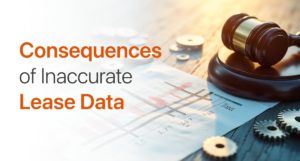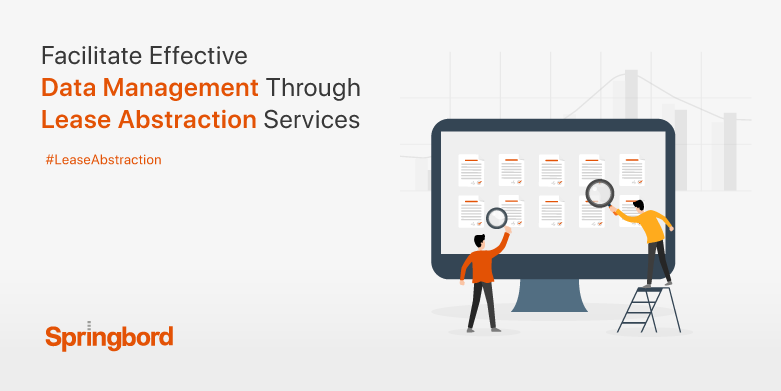 Read time 7 min
Read time 7 minIn the world of business operations, maintaining accurate lease data is important. Lease data encompasses a variety of crucial information including rent schedules, renewal options, termination clauses, and more. Any inaccuracies in this data can lead to significant financial, legal, and operational challenges. This blog explores the importance of accurate lease data and how effective lease abstraction can help business owners avoid costly mistakes.
Accurate lease data is the backbone of effective lease management. It ensures that all lease-related decisions are based on reliable information, thereby preventing financial losses and legal disputes. For business owners managing large property portfolios, the accuracy of lease data becomes even more critical.
According to Springbord, managing large volumes of leases efficiently requires sophisticated data management processes to avoid errors and ensure compliance with regulatory standards.
Relevance
Inaccurate lease data can lead to a host of issues, including overpayments, missed opportunities for renegotiation, and legal penalties. For instance, during the COVID-19 pandemic, businesses faced unprecedented challenges in lease management due to dynamic rent concessions and frequent lease modifications.
The need for accurate and timely data management became more pronounced as organisations struggled to adapt to new accounting standards and regulatory requirements.
Effective lease abstraction, therefore, is not just a procedural necessity but a strategic imperative. It enables businesses to capture and organise lease data accurately, facilitating better decision-making and ensuring compliance with evolving standards.
Lease Abstraction
Lease abstraction is the process of summarising the critical elements of a lease agreement into a concise and easily understandable format. This practice is essential for several reasons:
- Efficiency: By distilling complex and lengthy lease documents into key points, businesses can quickly reference essential information without wading through pages of legal text.
- Risk Management: Accurate lease abstraction helps identify potential risks and ensure lease terms compliance, thereby mitigating legal and financial liabilities.
- Decision-Making: With clear and accessible lease data, decision-makers can make informed choices regarding property management, lease renewals, and negotiations.
Industry Standards
Adhering to industry standards in lease abstraction is important for maintaining consistency and accuracy. Key benchmarks and standards include:
- Standardized Templates: Using predefined templates to ensure all essential elements are consistently captured across different leases.
- Automated Tools: Using technology to automate the abstraction process, reducing human error and increasing efficiency. Automated tools can help in extracting and organizing data quickly and accurately.
- Compliance with Accounting Standards: Ensuring that lease data aligns with relevant accounting standards such as IFRS 16 and ASC 842, which govern lease accounting practices.
- Regular Audits and Updates: Conducting periodic audits to verify the accuracy of abstracted data and updating records as lease terms and conditions change.
Springbord specializes in providing comprehensive lease abstraction services that align with industry standards and best practices.
Our team utilizes advanced technology and standardized processes to deliver accurate and reliable lease abstracts, helping businesses manage their lease portfolios effectively.
Consequences of Inaccurate Lease Data

Accurate lease data is essential for businesses managing property portfolios.
Inaccuracies can lead to significant financial, legal, and operational issues.
Financial Implications
Inaccurate lease data can have severe financial consequences for businesses. Errors in lease records can lead to overpayments, missed opportunities for renegotiation, and penalties.
- Overpayments: Inaccurate data can cause businesses to overpay rent or other lease-related expenses. For instance, if escalation clauses are not correctly recorded, companies might pay higher rents than necessary.
- Missed Opportunities for Renegotiation: Timely and accurate data is crucial for renegotiating lease terms. Missing key dates such as renewal or termination windows can result in unfavorable lease terms being extended automatically. This can prevent businesses from taking advantage of market conditions to negotiate better rates or terms.
- Penalties: Failure to adhere to lease terms due to inaccurate data can result in financial penalties. This includes late fees, interest on overdue amounts, and other penalty clauses that may be triggered by non-compliance.
Springbord ensures precise lease data management, reducing the risk of financial losses and helping businesses maintain optimal lease agreements.
Legal Risks
Incorrect lease data can expose businesses to significant legal risks. These risks can range from non-compliance with lease terms to potential lawsuits.
- Non-Compliance: Lease agreements often include numerous compliance requirements, such as maintaining specific insurance coverages or adhering to maintenance responsibilities. Inaccurate data can lead to non-compliance, resulting in legal action from landlords or regulatory bodies.
- Litigation: Disputes arising from incorrect lease data can lead to costly litigation. For example, discrepancies in rent payments or maintenance responsibilities can result in disputes that escalate to legal battles. This not only incurs legal fees but also diverts management’s attention from core business activities.
- Regulatory Violations: Lease agreements must comply with various local, state, and federal regulations. Inaccuracies in lease data can result in violations of these regulations, leading to fines and legal penalties. Ensuring accurate lease data is critical to maintaining regulatory compliance and avoiding legal repercussions.
Springbord’s expertise in lease abstraction and data management helps businesses stay compliant with all lease terms and regulations, minimizing legal risks.
Operational Disruptions
Operational disruptions caused by inaccurate lease data can lead to inefficiencies and downtime, affecting overall business performance.
- Inefficiencies: Inaccurate lease data can lead to inefficiencies in managing lease portfolios. For example, incorrect data can result in duplicated efforts, missed deadlines, and poor decision-making.
- Downtime: Disruptions in operations due to lease management issues can lead to business downtime. For instance, failure to manage lease renewals or terminations accurately can result in unexpected vacancies or eviction notices, disrupting business continuity.
- Resource Allocation: Managing lease portfolios with inaccurate data requires additional resources to correct errors and manage disputes. This diverts resources from other critical business functions, leading to inefficiencies and increased operational costs.
By using Springbord’s comprehensive lease management services, businesses can ensure accurate lease data, streamline operations, and maintain uninterrupted business activities.
Common Sources of Lease Data Inaccuracies

Accurate lease data is vital for effective property management and operational efficiency.
However, various factors can lead to inaccuracies in lease data, creating significant challenges for businesses. Understanding these sources of errors can help in implementing strategies to mitigate them.
Human Error
Human error is one of the most common sources of lease data inaccuracies. Manual data entry processes are prone to mistakes, which can have far-reaching consequences.
- Data Entry Mistakes: Typographical errors, incorrect data entries, and omissions are frequent issues. A study by IBM found that human error accounts for nearly 95% of all security incidents, highlighting the potential for mistakes in manual processes.
- Inconsistent Data Entry: Without standardized procedures, data entry can vary between individuals, leading to inconsistencies. This inconsistency can result in discrepancies that are difficult to reconcile.
- Misinterpretation: Data entry personnel may misinterpret lease terms due to a lack of understanding of legal language or complex lease clauses. This can lead to incorrect entries that affect lease management decisions.
By utilizing automated lease abstraction tools and implementing rigorous training programs, Springbord helps businesses minimize human error and ensure data accuracy.
Complex Lease Terms
Lease agreements often contain complex terms and conditions that can be challenging to interpret and manage accurately.
- Detailed Clauses: Leases can include detailed clauses related to rent escalation, maintenance obligations, and renewal terms. These clauses often require precise interpretation to ensure correct data abstraction.
- Legal Jargon: The legal language used in leases can be difficult to understand, especially for those without legal expertise. This can lead to misinterpretation and errors in data entry.
- Variable Terms: Many leases have variable terms that change over time, such as percentage rent based on sales or variable maintenance fees. Tracking and updating these variables accurately is crucial but challenging.
Springbord’s expertise in lease abstraction ensures that even the most complex lease terms are accurately captured and managed.
Outdated Information
Using outdated lease data can pose significant risks to businesses, leading to incorrect financial reporting and operational decisions.
- Missed Updates: Lease terms and conditions can change over time through amendments, renewals, or renegotiations. Failing to update these changes in the lease records can lead to inaccuracies.
- Compliance Issues: Outdated data can result in non-compliance with current lease terms or regulatory requirements. This non-compliance can lead to legal penalties and financial losses.
- Operational Disruptions: Decisions based on outdated information can cause operational disruptions, such as missed critical dates for renewals or terminations, leading to potential vacancies or overpayments.
A study by PwC found that 78% of companies have errors in their lease data due to outdated information, highlighting the importance of regular data updates.
Springbord’s data management services ensure that all lease data is current and accurate, preventing issues related to outdated information.
Benefits of Effective Lease Abstraction

Accurate and efficient lease abstraction is essential for businesses managing multiple properties.
It ensures data accuracy, supports informed decision-making, and aids in regulatory compliance and risk management.
Enhanced Accuracy
Effective lease abstraction significantly improves data accuracy by systematically capturing and summarizing key lease terms. This meticulous process eliminates errors and inconsistencies.
- Standardization: Using standardized templates ensures consistency and reduces the risk of errors.
- Automated Tools: Leveraging automated lease abstraction tools can further enhance accuracy by minimising human error.
- Quality Control: Regular audits and data validation ensure that the abstracted lease data remains accurate and reliable.
Springbord’s advanced lease abstraction services use standardized procedures and automated tools to ensure high data accuracy, reducing the risk of costly errors.
Better Decision-Making
Accurate lease data is crucial for informed decision-making. With precise and accessible lease information, businesses can make strategic decisions that optimize property management and financial performance.
- Timely Insights: Accurate lease data provides timely insights into key terms, enabling proactive decisions.
- Strategic Planning: With accurate lease abstracts, businesses can plan their lease portfolio strategy effectively, identifying opportunities for cost savings and optimizing lease terms.
- Risk Mitigation: Accurate data helps identify and mitigate potential risks.
Springbord’s services provide businesses with actionable lease data, supporting strategic decision-making and enhancing lease management.
Compliance and Risk Management
Proper lease abstraction ensures that all lease terms are accurately captured and monitored, helping businesses stay compliant with legal and regulatory requirements.
- Regulatory Compliance: Accurate abstraction ensures compliance-related information is correctly documented, avoiding legal penalties.
- Audit Readiness: Maintaining accurate and up-to-date lease data ensures that businesses are always prepared for audits.
- Risk Mitigation: By accurately capturing and monitoring lease terms, businesses can identify potential risks early and take corrective actions to mitigate them. This includes managing lease renewals, terminations, and other critical events effectively.
Springbord’s expertise ensures that businesses maintain accurate and compliant lease data, reducing legal risks and enhancing audit readiness.
Conclusion
Accurate lease data is fundamental to effective property management, ensuring financial stability, legal compliance, and operational efficiency. The consequences of inaccurate data can be severe, ranging from financial losses and legal disputes to operational disruptions.
Effective lease abstraction helps businesses avoid these pitfalls by improving data accuracy, supporting informed decision-making, and ensuring compliance with legal and regulatory standards.
Ensure your business avoids the pitfalls of inaccurate lease data with Springbord’s expert lease abstraction services. Our advanced technology and standardized processes guarantee precise, compliant, and actionable lease data.







